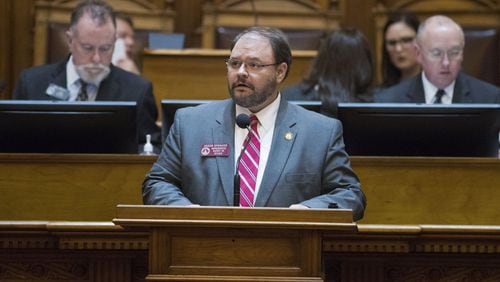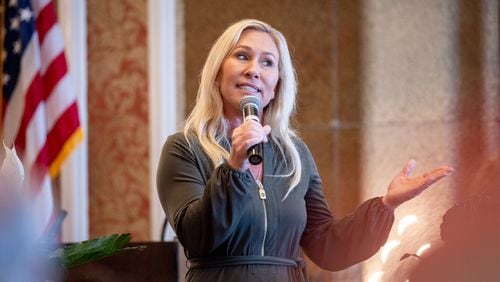Child sex abuse legislation that unanimously passed the Georgia House of Representatives last week has already encountered quiet opposition in the Senate, with advocates fearing it might never come to a vote and become law.
House Bill 605, dubbed the Hidden Predator Act, proposes to give adult survivors of childhood sexual abuse more time to sue by extending the statute of limitations for civil complaints. It affects claims against both the alleged perpetrators and, most controversially, organizations that let them act with impunity.
Sen. Bill Cowsert, a leader of the committee that controls the bill's fate, said he's already been approached by about a half dozen "interested parties" on both sides.
Cowsert, R-Athens, vice chairman of the Senate’s Judiciary Committee, said it’s a normal part of the process for lobbyists “to educate us, basically, and advocate for their viewpoint.”
But the bill's main author said opponents are quietly trying to "euthanize" it. Rep. Jason Spencer, R-Woodbine, has already publicly said the Georgia Catholic Conference, the Georgia Chamber of Commerce and the insurance industry lobbied against it in the House, adding that no entity worked harder to derail it than the Boy Scouts of America.
Opponents forced amendments that make it harder to sue organizations, he said, and they did it quietly. “What that tells me is they have something to hide.”
None of the organizations Spencer identified returned calls for comment Wednesday, but the Boy Scouts did issue a statement last month, saying they “strongly” supported parts of the bill while opposing it overall. The group said the bill “does not strengthen efforts that experts agree can help keep children safe” and that it “would hinder the ability of youth-serving organizations to protect the children they serve.”
It also could expose organizations to financial liability. The Boy Scouts are defending themselves against a lawsuit in Georgia that alleges a decades-long conspiracy to shield volunteers they knew to be child predators. In 2012, a Portland judge ordered the release of so-called perversion files — collected nationwide from 1965 to 1985 — that detailed the expulsion of 1,247 Scout volunteers. The lawsuit in Georgia claims there are more that haven't been released.
“The Boy Scouts literally have files on thousands of predators without disclosing it to the public,” said Darren Penn, a lawyer who is a proponent of the Hidden Predator Act. He has represented numerous clients who sued over sex abuse and said Georgia’s law is one of the toughest in the country for plaintiffs. He said the average age when victims come forward is 42, nearly two decades past the age when suits are allowed by Georgia’s statute of limitations.
The limit is currently age 23 but the bill would extend that to 38. It would also double to four years the amount of time that victims of any age have to sue after getting a diagnosis that the misery in their lives — such as substance abuse, or inability to keep a job or maintain a marriage — was caused by abuse they suffered as children.
It would also open a one-year window during which victims of any age could sue. Spencer said lobbyists tried to get that element deleted in the House and that senators on the Judiciary Committee tell him lobbyists are already trying again the Senate. If they succeed, he said, it would be harder to sue organizations like USA Gymnastics, accused of a coverup involving convicted pedophile Larry Nassar. Spencer said lobbyists already compelled him to change his bill in the House: It now says plaintiffs must be able to point to evidence of a coverup to sue organizations during the one-year window. He said it wouldn't have gotten out of the House without that concession.
It passed the House at the last possible moment last week, by a stunning 170-0.
Several Judiciary Committee senators contacted by The Atlanta Journal-Constitution said they had not been lobbied on the bill. "We're fairly early in the process," said Sen. Josh McKoon, R-Columbus, adding, "I'm sure I'll be hearing from folks about it." McKoon, who is running for Georgia Secretary of State, said he supports the "overall goal here of making sure victims have a remedy."
Cowsert, the committee vice chairman, said he hasn’t studied the bill or formulated an opinion about it. He said he was first approached about it before it even left the House, and of all the interested parties, he only named one — Penn, who is a former president of the Georgia Trial Lawyers Association. Cowsert said Penn “is trying to alter the law to assist his cases.”
Spencer, who authored the bill after his hometown struggled with sex-abuse claims involving a local karate instructor, said he just wants to open an avenue for justice. There is no statute of limitations for criminal charges involving child sex abuse, but that wasn’t always the case. The limit used to be seven years from the crime, until the law was changed in 2012, which means countless older victims can’t pursue prosecution. Spencer said he hopes an extension of the civil statute of limitations will surface older victims whose lawsuits then get the attention of younger people molested after 2012 by the same predators. He hopes it will embolden younger victims to go to the police instead of waiting until age 42, before more kids are abused.







